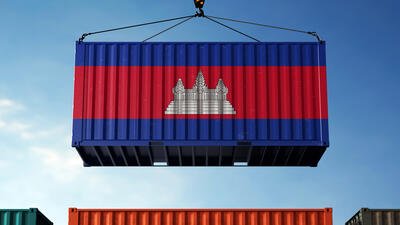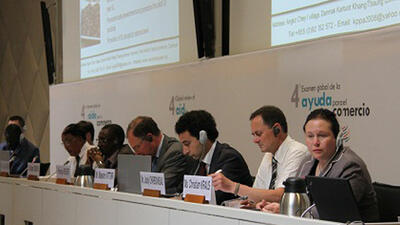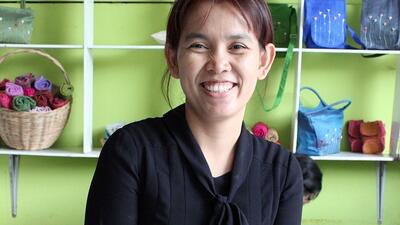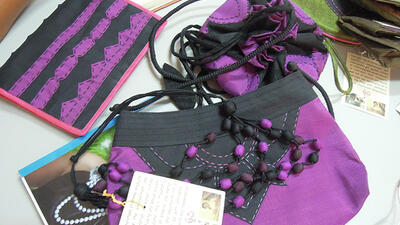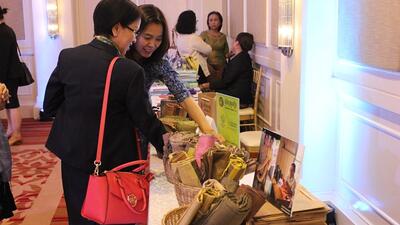


ITC Impact: Cambodia
Cambodian silk producers who benefitted from an ITC project to boost technical and marketing skills have seen their profits rise by 20 to 30%.
Beyond the increased profits, improved market perceptions of the quality of Cambodian silk have led to new sales opportunities for the producers, according to an independent evaluation of the project conducted for the Enhanced Integrated Framework, a multi-donor programme which helps the world’s poorest countries integrate into the world trading system.
‘We particularly benefitted from attendance at trade fairs, where I met important buyers and fashion designers who were very impressed by our products,’ said Seng Takakneary, owner of SentoSaSilk, who identified US$66,000 worth of new deals – the equivalent of three months’ business – during the two-day Artisans Resources trade fair in New York last August. ‘We also increased the sales at our shop in Phnom Penh by 10 to 20%, and identified eight new weavers groups in villages to work with, thanks to the project.’
The goal of the project is to alleviate poverty among rural weaving communities by improving technical skills, which in turn enable weavers and exporters to develop new products and designs that meet buyer requirements. It also aims to help them establish new marketing channels.
The direct beneficiaries, 14 women-owned businesses working with weavers in rural areas, have developed export plans, improved their marketing materials, upgraded showrooms and shops, developed new relationships with international buyers and prepared new product collections as part of the project, said Sylvie Bétemps Cochin, ITC’s project manager. Following training and product upgrading, they attended various trade fairs, signing new contracts and making new contacts for follow-up, she said. ‘The new contracts the group secured represent an important boost to their business,’ she added. ‘And the new relationships built are even more key.’
Sales at VillageWorks, a women-owned handicraft company that is a member of the World Fair Trade Organization, have increased by 40%, and the number of buyers is up by 85%, in the eighteen-month period since their participation in the project, said Anak Norm, General Manager. ‘Learning how to develop an export plan is making our business more professional,’ she said. ‘Through monitoring our export plans, we were able to compare our progress and assess if we are meeting our target.’
VillageWorks has created 20 new jobs thanks to orders from new European buyers. ‘We have set-up a new sewing workshop, where we provide employment to young handicapped people, mostly victims of polio,’ Norm explained. ‘We could employ them thanks to the orders we got through the ITC project.’
At Kravan House, Director Thanan Hok hired ten new seamstresses with disabilities. ‘The orders we got by participating in the Ambiente trade fair in Germany encouraged us to make the investment, which is a big step for us,’ she said.
The Government of Cambodia identified the silk industry as a strategic sector for poverty reduction. Silk weaving can directly contribute to job creation, particularly in rural communities.
Farmers and producers living in rural areas make up 85% of the Cambodian population. In the silk-weaving industry, women make up the vast majority of the 20,000-strong workforce.
In order to be competitive in international markets, the companies needed to adapt their designs to the tastes of their buyers, ITC’s Bétemps Cochin said. The project supported them in the development of new product lines: silk scarves, fashion accessories, lifestyle and home decoration products, in line with target market requirements and fashion trends.
Lotus silk, based in Phnom Penh, received support on preparing marketing materials, interacting with customers and establishing their brand, said owner Vannary San. Even more importantly, she received coaching on running a business, ‘We were given more focused one-on-one mentorship about our export plans,’ she said. ‘We were asked to review and recall our historical performance, and from there, derived our projections.’
Afecip Fair Fashion (AFF), a social enterprise that provides employment to women rescued from trafficking, has a marketing strategy for the first time. ‘We always relied on buyers coming to us.
When things get tougher, the buyers on whom we rely may disappear and then we have no buyer to turn to,’ said Director Rotha Tep. The company developed five new collections, met seven new contacts and is looking to close a US$4,000 deal following its participation at the Maison des Objets trade fair in Paris, its first-ever international exhibition.
The real results of the project lie in the trickle-down effects of the increased profits, Bétemps Cochin explained. ‘The additional income is typically invested in the development of small social businesses, training and education, with strong positive effects on both social and economic development.’




